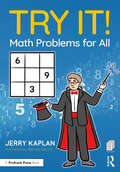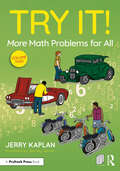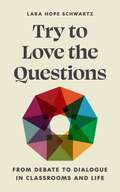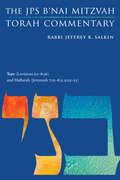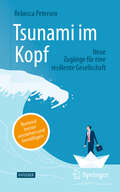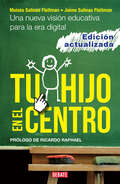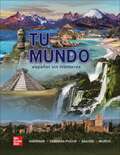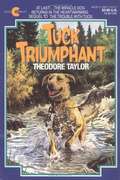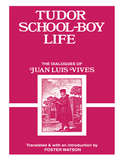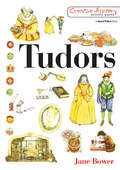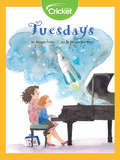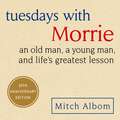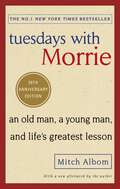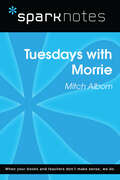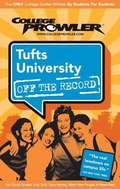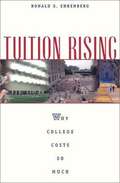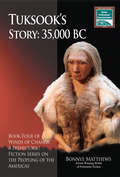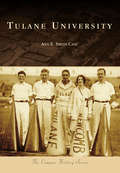- Table View
- List View
Try It! Math Problems for All
by Jerry KaplanThis is not your typical math book. Breaking away from the standard drill and practice routine, Try It! Math Problems for All is a collection of offbeat, open-ended math problems designed to make even the most math-averse student excited about working through these challenging yet accessible problems. The 25 illustrated problems vary in difficulty, motivating students to think creatively on their own, or to engage in teamwork and cooperation within a group, while the Hints and Solutions section guides teachers to probe, suggest, and encourage students to explore even their most unusual insights on the way to a solution. Perfect for any math classroom, club, after-school activity, or coaching session, Try It! celebrates not only the destination, but the journey, giving students a chance to relax, think differently, and, above all, have fun! Optional Student Workbook Packs In addition to this teacher's guide, companion student workbooks are available in packs of ten. The student workbooks feature ample room for student responses and notes, make reviewing and providing feedback on student work easier than ever, provide students with an easy-to-use reference to use during discussions, and save time, as there is no need to reproduce student handouts.
Try It! More Math Problems for All
by Jerry KaplanThis is not your typical math book. Try It! More Math Problems for All is the second of three collections of offbeat, open-ended problems designed to make even the most math-averse student excited about working through these challenging yet accessible problems. These are 25 new, illustrated problems varying in difficulty. They will motivate your students to think creatively on their own and to engage in teamwork. The Hints and Solutions section guides you to probe, suggest, and encourage students to explore even their most unusual insights on the way to a solution. And when students solve a problem, you will see and hear their accomplishments. Perfect for any math classroom, club, after school activity, or coaching session, Try It! celebrates not only the destination, but the journey, giving students a chance to think differently, and, above all, have fun! Can’t get enough? Volumes 1 and 3 in the series are also available at Routledge.com. Optional Student Workbook Packs In addition to this teachers' guide, companion student workbooks are available in packs of ten. The student workbooks feature ample room for student responses and notes, make reviewing and providing feedback on student work easy, provide students with a quick reference to use during discussions, and they save time — there is no need to reproduce student handouts.
Try to Love the Questions: From Debate to Dialogue in Classrooms and Life (Skills for Scholars)
by Lara SchwartzAn essential guide to dialogue in the college classroom and beyondTry to Love the Questions gives college students a framework for understanding and practicing dialogue across difference in and out of the classroom. This invaluable guide explores the challenges facing students as they prepare to listen, speak, and learn in a college community and encourages students and faculty alike to consider inclusive, respectful communication as a skill—not as a limitation on freedom.Among the most common challenges on college campuses today is figuring out how to navigate our politically charged culture and engage productively with opposing viewpoints. Lara Schwartz introduces the fundamental principles of free expression, academic freedom, and academic dialogue, showing how open expression is the engine of social progress, scholarship, and inclusion. She sheds light on the rules and norms that govern campus discourse—such as the First Amendment, campus expression policies, and academic standards—and encourages students to adopt a mindset of inquiry that embraces uncertainty and a love of questions.Empowering students, scholars, and instructors to listen generously, explore questions with integrity, and communicate to be understood, Try to Love the Questions includes writing exercises and discussion questions in every chapter, making it an indispensable resource for anyone interested in practicing good-faith dialogue.
Tsa-lerato O Ngwanaka: UBC contracted
by Mmabatho M MokokaKedibone moratiwa wa ga Obakeng o a ima mme Obakeng o lebane le go fetsa kwa Yunibesithing. Kedibone o boela morago kwa monneng o a mo tlhadileng mme monna o o itumeletse go tsaya molato wa ga Obakeng. Buisa! Kedibone falls pregnant, but her boyfriend is more focused on finishing school. Kedibone decides to go back to her ex- husband, who gladly accepts her pregnancy. Read how this story turns out!
Tsa-lerato O Ngwanaka: UBC uncontracted
by Mmabatho M MokokaKedibone moratiwa wa ga Obakeng o a ima mme Obakeng o lebane le go fetsa kwa Yunibesithing. Kedibone o boela morago kwa monneng o a mo tlhadileng mme monna o o itumeletse go tsaya molato wa ga Obakeng. Buisa! Kedibone falls pregnant, but her boyfriend is more focused on finishing school. Kedibone decides to go back to her ex- husband, who gladly accepts her pregnancy. Read how this story turns out!
Tsav: The JPS B'nai Mitzvah Torah Commentary (JPS Study Bible)
by Rabbi Jeffrey K. SalkinTsav (Leviticus 6:1-8:36) and Haftarah (Jeremiah 7:21-8:3; 9:22-23): The JPS B’nai Mitzvah Torah Commentary shows teens in their own language how Torah addresses the issues in their world. The conversational tone is inviting and dignified, concise and substantial, direct and informative. Each pamphlet includes a general introduction, two model divrei Torah on the weekly Torah portion, and one model davar Torah on the weekly Haftarah portion. Jewish learning—for young people and adults—will never be the same. The complete set of weekly portions is available in Rabbi Jeffrey K. Salkin’s book The JPS B’nai Mitzvah Torah Commentary (JPS, 2017).
Tsunami im Kopf – Burnout besser verstehen und bewältigen: Neue Zugänge für eine resiliente Gesellschaft
by Rebecca PetersenDie Burnout-Erkrankung ist, insbesondere im Schulwesen, nach wie vor ein aktuelles und gesellschaftsrelevantes Thema, über das kaum gesprochen wird. Es ist, je nachdem mit viel Scham- und Schuldgefühlen behaftet. Jeder hat ein eigenes Bild von einer Burnout-Erkrankung - doch entspricht dieses tatsächlich der Wirklichkeit? Und wenn ja, warum trifft es dann so viele Menschen scheinbar unbemerkt? Diesen Umstand möchte die Autorin mit ihrem Buch und den darin enthaltenen Zugängen für Organisationen, Teams, Führungskräfte, BeraterInnen, aber auch Betroffene und deren Familien und Freunde ändern und eine neue Sensibilität für gesellschaftliche Verantwortung schaffen. Sie baut damit eine Brücke zu einer neuen Sicht auf Resilienz und Gesundheit und liefert dadurch einen aktiven Beitrag zur Prävention und Aufklärung. Ihr Buch schafft Zugang und Leichtigkeit für ein ernstzunehmendes Thema und ermöglicht dadurch einen offenen, gesunden Umgang mit einer vielschichtigen, heimtückischen und lebensverändernden Erkrankung.
Tu hijo en el centro: Una nueva visión educativa para la era digital
by Moisés Salinas FleitmanLa economía, la sociedad y la cultura del siglo XXI son radicalmente diferentes a aquellas del siglo pasado gracias a internet y específicamente a las redes sociales. Sin embargo, el salón de clases y los métodos pedagógicos siguen siendo esencialmente los mismos. ¿En qué falla la educación de hoy en día en México que no responde a las necesidades de nuestra era? En el marco de un sistema educativo en crisis, con un modelo anticuado y un sindicalismo opaco, la presente obra constituye un llamado urgente para analizar sus fallas y buscar alternativas de solución. La clave, de acuerdo con la investigación de Moisés Salinas Fleitman y Jaime Salinas Fleitman, se halla en la implementación de un modelo educativo constructivista, centrado en el estudiante, en el cual el alumno aprenda de manera crítica y creativa. De esta forma descubrirá cómo participar en la transformación de su mundo: una educación apropiada a las exigencias científicas y tecnológicas del siglo XXI. "Los hermanos Salinas Fleitman nos entregan un texto bien reflexionado sobre los desafíos educativos que enfrenta la escuela mexicana. Su conocimiento sobre el tema es amplio y su capacidad para compartirlo es generosa." Ricardo Raphael "Este libro nos demuestra por qué la escuela debe ser más que un lugar donde se transmiten conocimientos; ahí los niños deben desarrollar su máximo potencial a fin de ser mejores seres humanos, y así tener una mejor sociedad. Se trata de una lectura obligada para todos los padres interesados en la educación de sus hijos." Leo Zuckermann
Tu mundo
by Magdalena Andrade Jeanne Egasse Elías Miguel Muñoz María José Cabrera-PucheTu mundo immerses the Introductory Spanish classroom in a culturally rich world full of opportunities to discover and explore the powerful connections between language and culture. Instructors are provided user-friendly resources to guide students as they dive into intensive communicative practice, building confidence in their ability to interact in meaningful ways in Spanish. Instructors are also provided with the tools to build a sense of community in face-to-face, hybrid, and online classes, resulting in a unique personal experience that evolves organically and sparks a natural curiosity about their world. The hallmarks of Tu mundo are: Communicative and Flexible: Tu mundo is designed to work well with a variety of communicative approaches. The goal is to provide an ideal environment where acquisition can take place, without fear of making mistakes. By jumping directly into communicative practice, students immerse themselves in the experience of active learning. This involves preparing at home using a variety of learning resources, prepping the necessary vocabulary and grammar in advance, and then coming to class ready to engage in conversation. Consistency and Performance: Tu mundo offers a dynamic adaptive learning tool called Adaptive Learning Assignments that focus students on the grammar and vocabulary they haven’t yet mastered, filling the gaps to prepare them for in-class communication. Community and Connections: Whether in a physical classroom or in an online course via Connect Spanish, students are provided with opportunities to engage in meaningful conversations and collaborative task-based activities that enable students to practice their language skills making connections and understanding the Hispanic world. Meaningful and real-life experience: Culture is often left behind - so Tu mundo offers it throughout. Each chapter features a country of focus, which doubles as the home country of one of the fifteen amigos. In addition to the in-chapter cultural sections, every chapter of Tu mundo features a second video segment called Mi país, narrated by the amigos themselves as they share information about their native countries. This window into the lives of the amigos provides a point of comparison in which students can interact with language and culture in a meaningful way.
Tuck Triumphant
by Theodore TaylorIn the long-awaited sequel to the trouble with Tuck, Helen's blind Labrador faces his greatest challenge ever when his own Seeing Eye dog is brutally killed and Tuck uses all of his senses to help a frightened Korean orphan who can't hear.
Tudor School Boy Life: The Dialogues Of Juan Luis Vives
by Juan Luis VivesFirst published in 1970. Routledge is an imprint of Taylor & Francis, an informa company.
Tudors
by Jane BowerThe innovative Creative History Activity Packs series is designed to help teachers bring history topics to life through imaginative creative arts activities. Each pack includes ten laminated, double-sided cards, printed in full color. Each card describes in detail activities that recreate aspects of life in a particular historical period, using art, drama and dance. Each activity is based on historically researched authentic practices of the time. Ideal for whole class or small group sessions, the packs are an inspiration for busy teachers looking for new ways to approach project work at Key Stage 2 - and are easily applicable for Key Stage 1 classes. Tudor activities in this pack include creating clove pomanders and soap balls; painting miniatures to mount as jewelry; making your own ink and writing a Tudor menu; making a miniature book for herbs, recipes or prayers; Tudor recipe ideas; and structured outlines for drama and dance.
Tuesdays
by Rhonda TelferFinn is reluctant to go to piano lessons, but when Miss Bea shows him how the instrument works, he begins to discover the magic of music.
Tuesdays With Morrie: An old man, a young man, and life's greatest lesson
by Mitch AlbomMaybe it was a grandparent, or a teacher or a colleague. Someone older, patient and wise, who understood you when you were young and searching, and gave you sound advice to help you make your way through it. For Mitch Albom, that person was Morrie Schwartz, his college professor from nearly twenty years ago.Maybe, like Mitch, you lost track of this mentor as you made your way, and the insights faded. Wouldn't you like to see that person again, ask the bigger questions that still haunt you? Mitch Albom had that second chance. He rediscovered Morrie in the last months of the older man's life. Knowing he was dying of ALS - or motor neurone disease - MItch visited Morrie in his study every Tuesday, just as they used to back in college. Their rekindled relationship turned into one final 'class': lessons in how to live.TUESDAYS WITH MORRIE is a magical chronicle of their time together, through which Mitch shares Morrie's lasting gift with the world.
Tuesdays With Morrie: An old man, a young man, and life's greatest lesson
by Mitch AlbomTHE GLOBAL PHENOMENON THAT TOUCHED THE HEARTS OF OVER 9 MILLION READERS'Mitch Albom sees the magical in the ordinary' Cecilia Ahern__________Maybe it was a grandparent, or a teacher or a colleague? Someone older, patient and wise, who understood you when you were young and searching, and gave you sound advice to help you make your way through it? For Mitch Albom, that person was Morrie Schwartz, his college professor from nearly twenty years ago.Maybe, like Mitch, you lost track of this mentor as you made your way, and the insights faded. Wouldn't you like to see that person again, ask the bigger questions that still haunt you?Mitch Albom had that second chance. He rediscovered Morrie in the last months of the older man's life. Knowing he was dying of ALS - or motor neurone disease - Mitch visited Morrie in his study every Tuesday, just as they used to back in college. Their rekindled relationship turned into one final 'class': lessons in how to live.Tuesdays with Morrie is a magical chronicle of their time together, through which Mitch shares Morrie's lasting gift with the world.__________WHAT READERS SAY ABOUT TUESDAYS WITH MORRIE'You cannot put the book down until you reach the end . . . Too good to be missed. It is really an all-time hit''One of the most beautiful books I've read in a long, long time . . . It will always be one of my favourite books''This book moved me immensely and its teachings will stay with me''A simple yet moving account of love and loss - but also hope for something better''A book I will read and re-read'
Tuesdays with Morrie (SparkNotes Literature Guide Series)
by SparkNotesTuesdays with Morrie (SparkNotes Literature Guide) by Mitch Albom Making the reading experience fun! Created by Harvard students for students everywhere, SparkNotes is a new breed of study guide: smarter, better, faster. Geared to what today's students need to know, SparkNotes provides: *Chapter-by-chapter analysis *Explanations of key themes, motifs, and symbols *A review quiz and essay topicsLively and accessible, these guides are perfect for late-night studying and writing papers
Tufts University (College Prowler)
by Emily ChasanNo university affiliations. No half-truths. No out-of-touch authors who haven't been in school for decades. A class project turned company, College Prowler produces guidebooks that are written by actual college students and cover the things students really want to know. Unlike other guides that jam everything into a five-pound book and devote only two pages to each college, our single-school guidebooks give students only the schools they want and all the information they need. From academics and diversity to nightlife and sports, we let the students tell it how it is. In addition to editorial reviews and grades for 20 different topics, more than 80 percent of each guide is composed of actual student reviews of their school. Whether readers are looking for "Best and Worst" lists, "Did You Knows?" or traditions, College Prowler guides have it all. Our books are the only place for local slang, urban legends, and tips on the best places to find a date, study, or grab a bite to eat.
Tug and the Bug (Word Family Readers)
by Liza CharlesworthCan Tug help this little bug find a snug home? See for yourself in this terrific tale that teaches lots and lots of -ug words. Let's Learn Readers boost key literacy skills through engaging, easy-to-read stories. Jump-start phonics learning with these super-fun books! For use with Grades K-2.
Tugga-Tugga Tugboat: A Read-Along Book
by Kevin LewisAvailable for the first time as an eBook read by the author! Kevin Lewis and Daniel Kirk team up for another classic rhyming picture book, and bath time has never been so much fun. Tankers, barges, and boats of all shapes and sizes come to life in this aquatic adventure featuring a determined tugboat and his crew. Daniel Kirk???s colorful illustrations and Kevin Lewis???s exuberant narration will make this story a hit with young seafarers everywhere.
Tuition Rising: Why College Costs So Much - With A New Preface
by Ronald G. EhrenbergAmerica's colleges and universities are the best in the world. They are also the most expensive. Tuition has risen faster than the rate of inflation for the past thirty years. There is no indication that this trend will abate. Ronald G. Ehrenberg explores the causes of this tuition inflation, drawing on his many years as a teacher and researcher of the economics of higher education and as a senior administrator at Cornell University. Using incidents and examples from his own experience, he discusses a wide range of topics including endowment policies, admissions and financial aid policies, the funding of research, tenure and the end of mandatory retirement, information technology, libraries and distance learning, student housing, and intercollegiate athletics. He shows that colleges and universities, having multiple, relatively independent constituencies, suffer from ineffective central control of their costs. And in a fascinating analysis of their response to the ratings published by magazines such as U. S. News & World Report, he shows how they engage in a dysfunctional competition for students. In the short run, colleges and universities have little need to worry about rising tuitions, since the number of qualified students applying for entrance is rising even faster. But in the long run, it is not at all clear that the increases can be sustained. Ehrenberg concludes by proposing a set of policies to slow the institutions' rising tuitions without damaging their quality.
Tukaramanche Nivadak Abhang FYBA - SPPU: तुकारामांचे निवडक अभंग एफ.वाय.बी.ए. - सावित्रीबाई फुले पुणे यूनिवर्सिटी
by P. N. Joshi'तुका आकाशाएवढा' असे स्वतः तुकारामांनीच म्हटले आहे. आमचा निवास त्रिभुवनात असतो. आम्ही खरे म्हणजे वैकुंठात राहणारे, पण जनांचा उध्दार करण्यासाठी या पृथ्वीवर आलो, अशी त्यांची साक्ष आहे. आकाशाऐवढे तुकाराम अणुरेणूपेक्षाही सूक्ष्म असतात. त्यांच्या पिंडात ब्रह्मांड साठवलेले असते. एन्हवी पाहिले तर तुकाराम अगदी साधे कुणबी प्रवृत्तीचे दिसतात. धंदा नीट चालला नाही, घरी बायको तोंडाळ, घरात उपासमार, सर्वत्र फजितीचा प्रसंग, पण ईश्वरी योग असा की, संसारतापाने त्रस्त झालेले तुकाराम 'नित्य नवा दीस जागृतीचा' असा अनुभव घेऊन 'तुका झाला पांडुरंग' या अवस्थेला ते पोचले. मंजुळ व रसाळ वाणी त्यांच्या मुखातून स्त्रवू लागली. ते मराठी मनाचे एकमेव संतकवी बनले. तुकारामांचे व्यक्तिमत्त्व आकाशाएवढे कसे बनले ? या प्रश्नाचे उत्तर या लहानश्या पुस्तकात मिळेल.
Tuksook’s Story, 35,000 BC: Book Four of Winds of Change, a Prehistoric Fiction Series on the Peopling of the Americas (Winds of Change, a Prehistoric Fiction Series on the Peopling of the Americas #4)
by Bonnye MatthewsThe Winds of Change novel series examines a few issues: * When people came to the Americas, * Who came to the Americas, and * From where did they come? The Winds of Change novel series views the peopling of the Americas primarily from research over the last 15 years. The series takes the what if" perspective. What might it have been like if the Americas abounded in human life long before 12,000 years ago?
Tulane University (Campus History)
by Ann E. CaseTulane University was founded as the Medical College of Louisiana in 1834 by seven young doctors who saw the need for trained physicians in the city of New Orleans. In 1847, it evolved into the public University of Louisiana, also offering law, liberal arts, and science coursework; it became a private institution in 1884 after Paul Tulane's donation. The addition of Newcomb College, the nation's first coordinate women's college, completed the university's basic structure in 1886. In 2005, Hurricane Katrina struck, forcing Tulane to close for a semester. It emerged from the floodwaters restructured and renewed into the progressive university focused on public service that it is today. The photographs in this book take readers through the collegiate experience of former Tulane and Newcomb students to illustrate the meaning of the Tulane motto, "Non sibi sed suis"--"Not for one's self, but for one's own."
